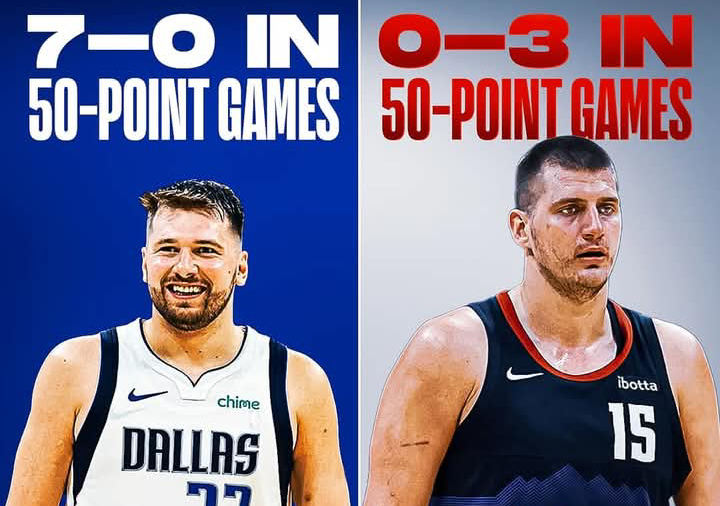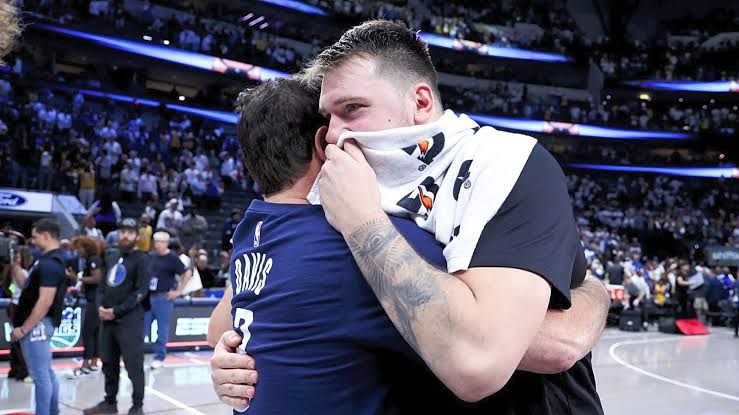
The Luka Doncic and Nikola Jokic Paradox: Scoring Dynamics and Team Success…
Basketball is often viewed as the ultimate team sport, but individual brilliance frequently dominates headlines. Two of the NBA’s brightest stars, Luka Doncic of the Dallas Mavericks and Nikola Jokic of the Denver Nuggets, have showcased incredible individual talent. However, a curious pattern emerges when comparing their relationship with team success. For Doncic, the Mavericks’ victories seem tied to his scoring heroics. In contrast, Jokic’s scoring outbursts often coincide with team struggles. This paradox offers a fascinating lens into the nature of leadership, playstyle, and team dynamics in basketball.
Luka Doncic: The Scoring Catalyst
Luka Doncic has quickly become one of the NBA’s premier superstars. The Slovenian phenom, known for his step-back threes, incredible court vision, and clutch performances, often carries the Mavericks on his back. His high-scoring games are not just entertaining but also crucial for Dallas’ success. When Doncic scores 30 or more points, the Mavericks’ winning percentage surges significantly.
This pattern is not surprising, given the team’s reliance on him as the primary offensive engine. Doncic leads the Mavericks in usage rate, meaning the ball is in his hands more often than not. Whether it’s orchestrating pick-and-rolls, driving to the basket, or hitting contested jumpers, he is the focal point of Dallas’ offensive system.
The Mavericks’ roster construction amplifies this dependence. While Dallas has solid complementary players, such as Kyrie Irving, Tim Hardaway Jr., and Josh Green, they lack a secondary star who can consistently carry the scoring load. This means that when Doncic performs at an elite scoring level, the Mavericks are tough to beat.
Moreover, Doncic’s ability to take over games in the fourth quarter has cemented his reputation as one of the league’s most clutch players. His scoring in crunch time often determines the outcome of close games, making his individual performance almost synonymous with the team’s success.
However, this reliance comes with risks. On nights when Doncic struggles, the Mavericks often flounder. The team’s heavy dependence on his scoring underscores a lack of balance that could be problematic in high-pressure playoff scenarios.
Nikola Jokic: The Selfless Superstar
Nikola Jokic, the reigning MVP and arguably the most unique player in the league, presents a stark contrast. Jokic’s game is defined by selflessness. His ability to pass, rebound, and control the tempo of the game is unmatched for a center. Yet, when Jokic scores big, the Nuggets often struggle.
At first glance, this seems counterintuitive. How could one of the league’s best players scoring at a high level correlate with team losses? The answer lies in the Nuggets’ system and Jokic’s role within it. Denver thrives on balanced scoring and ball movement, with Jokic as the facilitator. When Jokic racks up points, it often means the offense is out of sync, and his teammates are struggling to contribute.
This dynamic is particularly evident in games where injuries or poor shooting plague the team. Jokic, ever the team-first player, takes on more of the scoring burden when his teammates falter. While his ability to score at will is impressive, it often signals a lack of rhythm in Denver’s offense.
Contrast this with games where Jokic records a triple-double with moderate scoring. In these instances, the Nuggets’ offense hums, with players like Jamal Murray, Michael Porter Jr., and Aaron Gordon stepping up. The team is at its best when Jokic acts as the hub, orchestrating a fluid offense that keeps defenses guessing.
Jokic’s unselfish style is a double-edged sword. While it makes the Nuggets a formidable team when everyone is clicking, it also highlights the team’s dependence on his ability to elevate others. When his supporting cast falters, even Jokic’s brilliance as a scorer can’t compensate for the lack of overall team production.
Playstyle and Philosophy: A Study in Contrasts
The stark difference in how Doncic and Jokic impact their teams’ success speaks to their distinct playstyles and team philosophies.
Doncic embodies a heliocentric style of basketball, where one player dominates the offense. This approach maximizes his scoring and playmaking abilities but places immense pressure on him to perform at an elite level every night. The Mavericks’ reliance on Doncic mirrors the approach taken by teams built around other ball-dominant stars, such as James Harden during his Houston Rockets tenure.
In contrast, Jokic represents a more egalitarian approach. The Nuggets’ system emphasizes ball movement, spacing, and contributions from multiple players. Jokic’s role as a facilitator ensures that the offense flows through him, but not necessarily to him. This system thrives on collaboration, making Denver a more balanced and versatile team.
Both styles have their merits and drawbacks. Doncic’s dominance can lead to spectacular individual performances and dramatic wins but leaves the Mavericks vulnerable when he has an off night. Jokic’s selflessness creates a cohesive team dynamic but can backfire when his teammates are unable to deliver.
The Psychological Factor
Another layer to consider is the psychological impact of these scoring patterns. When Doncic has a big scoring night, it energizes his teammates and fans. His ability to take over games instills confidence and creates a sense of inevitability.
On the other hand, Jokic’s high-scoring games can sometimes reflect desperation. If Jokic is forced to carry the scoring load, it often means the Nuggets are playing from behind or struggling to execute their game plan. This dynamic can deflate the team’s morale, as it signals that their system is not functioning as intended.
What Does This Mean for Championship Aspirations?
For both the Mavericks and the Nuggets, these patterns have significant implications for their championship hopes.
The Mavericks need to build a more balanced roster around Doncic. While his scoring brilliance can carry the team to regular-season victories, the playoffs demand a more diversified offensive approach. Adding another reliable scorer or strengthening their defense could alleviate the burden on Doncic and make the Mavericks more resilient in high-stakes games.
The Nuggets, meanwhile, must continue to prioritize depth and balance. Their championship aspirations hinge on maintaining their system of shared responsibilities. While Jokic is undoubtedly their cornerstone, their success depends on the collective contributions of players like Murray, Porter, and Gordon.
Conclusion: Two Stars, Two Paths
Luka Doncic and Nikola Jokic are two of the NBA’s most captivating players, but their paths to team success couldn’t be more different. Doncic’s scoring brilliance is a necessity for the Mavericks, while Jokic’s scoring often signals trouble for the Nuggets.
This paradox highlights the complexity of basketball and the diverse ways in which superstars can impact their teams. While Doncic and Jokic approach the game differently, their shared goal remains the same: leading their teams to championship glory. The question is whether their respective organizations can build the right systems around them to make that dream a reality.








